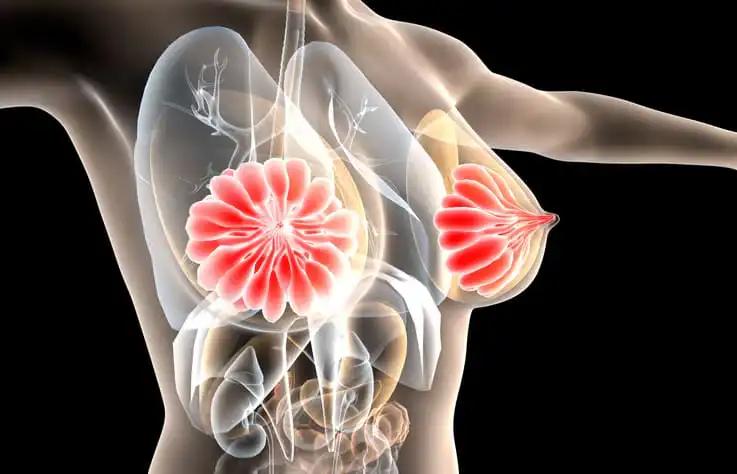KEY TAKEAWAYS
- The phase 3 monarcHER trial compares abemaciclib plus trastuzumab with or without fulvestrant.
- The trial compares PFS of abemaciclib plus trastuzumab with or without fulvestrant versus standard-of-care chemotherapy.
- Abemaciclib, fulvestrant, and trastuzumab significantly increased progression-free survival compared to standard-of-care chemotherapy plus trastuzumab while being safe.
- Neutropenia was the most prevalent grade 3-4 treatment-emergent adverse event in all groups during pyrexia and diarrhea.
- These findings propose a chemotherapy-free strategy for HER2-positive advanced breast cancer patients who have received two or more prior treatments.
After two or more lines of treatment for advanced HER2-positive breast cancer, patients are left with few viable options. Abemaciclib plus trastuzumab with or without fulvestrant was compared to standard-of-care chemotherapy of physician’s choice plus trastuzumab in the monarcHER study for women with advanced breast cancer. Seventy-five hospitals, clinics, and medical centres in 14 countries participated in this phase 2 three-group open-label study. Patients who met the inclusion criteria had received at least two HER2-targeted therapies for advanced disease and were 18 years or older, and had hormone receptor-positive, HER2-positive advanced breast cancer with unresectable, locally advanced, recurrent or metastatic disease and an Eastern Cooperative Oncology Group performance status of 0 or 1.
Abemaciclib, trastuzumab, and fulvestrant (group A), abemaciclib and trastuzumab (group B), and standard-of-care chemotherapy and trastuzumab (group C) were the three treatment groups to which patients were randomly assigned in a 1:1:1 ratio (group C). On days 1-21 of a 21-day cycle, patients took 150 mg of oral abemaciclib every 12 hours; on day 1 of the first cycle, patients received 8 mg/kg of intravenous trastuzumab; on day 1 of each subsequent 21-day cycle, patients received 6 mg/kg of intravenous trastuzumab; and on day 1, patients took 500 mg of intramuscular fulvestrant.
According to the instructions on the drug label, standard chemotherapy was given. Using an interactive web-response system, patients with advanced breast cancer who had received one or more prior systemic therapy were randomly assigned to receive either a placebo or an investigational new drug. Investigator-assessed progression-free survival in the intention-to-treat population was the primary endpoint. Groups A and C were compared first, and if there was a statistically significant difference, groups B and C were compared. Each patient who had received at least one dose of the study medication was evaluated for safety.
A total of 325 patients were screened between May 31, 2016, and February 28, 2018, and 237 were ultimately enrolled and randomly assigned to groups A (n=79), B (n=79), and C (n=79). The average duration of follow-up was 19.5 months (IQR 14–7–25.1). The primary goal was achieved, as the difference in median progression-free survival between Group A (8.3 months, 95% CI 5.9-12.6) and Group C (5.5 months, 5.4 months, 7.0 months; HR 0.67 [95% CI 0.45-1.00]; p=0.051) was statistically significant at the prespecified two-sided of 0.02. On the other hand, median progression-free survival in Group B (5.7 months, 95% CI 4.2-7.2) was not significantly different from Group C (HR 0.94 [0.64-1.38]; p=0.77).
Neutropenia was the most common treatment-emergent adverse event in all three groups (21% of 78 patients, 22% of 77 patients, and 26% of 72 patients, respectively). There were three cases of fever (4%), two cases of diarrhea (3%), two cases of urinary tract infection (3%), and two cases of acute kidney injury (3%), all in Group A; two cases of diarrhea (3%) and two cases of pneumonitis (3%) in Group B; four cases of neutropenia (6%), and two cases of pleural effusion (3%) in Group C.
One fatality in Group B was linked to pulmonary fibrosis, while another death in Group C was caused by febrile neutropenia. Abemaciclib, fulvestrant, and trastuzumab showed a manageable safety profile while significantly increasing progression-free survival compared to standard-of-care chemotherapy plus trastuzumab. Based on the findings, individuals with hormone receptor-positive, HER2-positive advanced breast cancer may benefit from a chemotherapy-free regimen.
Source: https://pubmed.ncbi.nlm.nih.gov/32353342/
Clinical Trial: https://clinicaltrials.gov/ct2/show/NCT02675231
Tolaney SM, Wardley AM, Zambelli S, Hilton JF, Troso-Sandoval TA, Ricci F, Im SA, Kim SB, Johnston SR, Chan A, Goel S, Catron K, Chapman SC, Price GL, Yang Z, Gainford MC, André F. Abemaciclib plus trastuzumab with or without fulvestrant versus trastuzumab plus standard-of-care chemotherapy in women with hormone receptor-positive, HER2-positive advanced breast cancer (monarcHER): a randomised, open-label, phase 2 trial. Lancet Oncol. 2020 Jun;21(6):763-775. doi: 10.1016/S1470-2045(20)30112-1. Epub 2020 Apr 27. Erratum in: Lancet Oncol. 2021 Mar;22(3):e92. Erratum in: Lancet Oncol. 2021 Nov;22(11):e472. PMID: 32353342.



